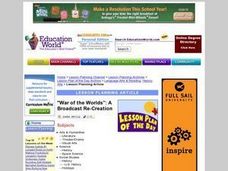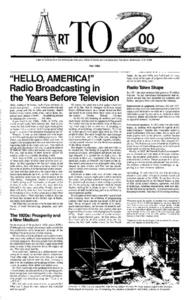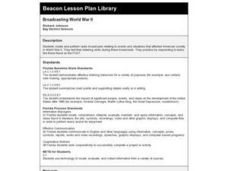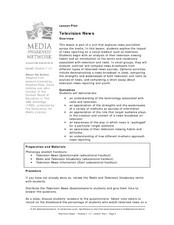Carolina K-12
World War II through the Radio Waves
Young historians channel the very medium used to convey news during World War I. They create and present a five-minute radio broadcast on a particular topic from the war, such as the roles of African Americans and women, war bonds,...
Institute of Electrical and Electronics Engineers
Radio Reception and Transmission
After reading about radio transmission, application, and the difference between AM and FM, small teams of engineers use a kit to construct an FM radio and then send and receive broadcasts. This is an ideal activity for middle school STEM...
Media Smarts
The Broadcast Project
As part of a unit on media studies, kids are asked to chart their viewing habits, observe the advertising that sponsors their favorite shows, and then to imagine what they would broadcast if given a block of airtime.
Curated OER
"War of the Worlds": A Broadcast Re-Creation
Why did Orson Welles' 1938 Broadcast of a adaptation of H.G. Wells' The War of the Worlds cause such a panic? To answer this question, class members listen to the original broadcast and research the panic that resulted. They then engage...
Curated OER
Radio Program
High schoolers identify and assess the impact of unions on workers, management, and community. They listen to radio stories, students are asked what can they conclude about the impact of unions on the lives of the workers, management,...
Curated OER
Radio News
Part of a larger unit from the Media Awareness Network on media literacy, this particular lesson plan focuses on the medium of news radio. Small groups participate in discussions on their radio listening habits as well as the...
Newseum
Use ‘War of the Worlds’ to Teach Media Literacy
Orson Welles' 1938 radio broadcast of "War of the Worlds" is the focus of a lesson that looks at the importance of clarity in broadcasting. After listening to the radio broadcast, class members discuss the ethical obligations to...
Carolina K-12
The Major Conferences of World War II
Young historians create a 1940's news radio broadcast on the five major World War II conferences, including the Atlantic, Casablanca, Tehran, Yalta, and Potsdam.
Curated OER
Radio Broadcasting Before Television
Students compare the radio to other forms of mass communication. In this Radio Broadcasting Before Television lesson, students learn the different types of radio shows in the 1920s and 30s. Students write and perform radio scripts...
Curated OER
Back to the Past
What was the Untied States like in 1938? What were the concerns of Americans in the post World War I era? What were their fears? What were their sources of news and entertainment? To understand the reaction to Orson Welles' radio...
Curated OER
Orchestrated Hell
Students evaluate a radio broadcast by correspondent Edward R. Murrow as a primary historic source. The broadcast, popularly known as "Orchestrated Hell" recounts Murrow's experiences with a Royal Air Force bomber crew on a raid over...
Pulitzer Center
Food Insecurity
Food insecurity, whether as a result of food scarcity or a lack of nutritious food, is a growing and serious problem in the world today. After discussing the concept of food insecurity, learners listen to an NPR radio broadcast on the...
Curated OER
Broadcasting World War II
Third graders listen to several broadcasts from the WWII era. They research, write and perform simulated radio broadcasts concerning topics related to American society in World War II.
Curated OER
How Communication Technologies Affect People
Third graders complete a worksheet, first with known information, and then with researched information. They create a PowerPoint, video, or radio broadcast to convey the results of their research. They learn to use a graphic organizer to...
Curated OER
Using the Commentaries in Class
Students examine language and communication by listening to a commentary radio show. In this communications lesson plan, students listen to Michael Josephson's radio broadcast using the Internet and analyze his words and their meaning....
Curated OER
Power and Impact of Radio as a Broadcast Medium
Students compare radio coverage of news events with coverage of 21st century new stories. They analyze various forms of media as they relate to news coverage. They write an essay comparing the impact of radio versus that of television
Curated OER
Television News
Different media sources portray news in a variety of ways. In groups of three, learners look at different news sources, bringing in all the findings the next day. Three handouts help scholars compare sources, define specific terms used...
Curated OER
Voice of History
Way before the digital age radio was the medium of popular culture. After listening to excerpts from radio programs (easily available on the Internet), participants return to the radio age by creating a two-minute sketch based on a...
Curated OER
Disasters (Natural & Man-made)
Young scholars chose a natural or man-made disaster, such as a tornado or an oil spill, to research using the assigned web sites. They choose a presentation type from a list which includes poetry, radio broadcasts, and safety brochures,...
Curated OER
ESL English Grammar Lesson: The Royal Wedding
Have your ESL learners practice their written and oral English grammar skills, with this highly engaging ESL Lesson. Budding grammarians mingle across the room discovering what they each know about the Royal Wedding between Kate and...
Agriculture in the Classroom
Growing a Nation (1930-1949): From Defeat to Victory, Lesson 2
Using primary source materials including radio broadcasts, films, and interview transcripts, history students gain a better understanding of the Dust Bowl, relief efforts for farmers, and the nation's agricultural past. It includes...
American Battlefield Trust
Civil War Overview: Elementary Lesson Plan
How do you teach the Civil War and all its intricacies within the time limits of an average school day? Using a three-part plan, teachers easily integrate coverage of key Civil War battles into the unit. The lesson includes activities to...
Smithsonian Institution
The Soldier’s Experience—Vietnam versus World War I
The Vietnam War and World War I were two very important—and different—wars. To understand the differences, and similarities, class members watch videos, examine primary source documents, and then create a newscast that examines the...
Curated OER
Webquest: Eradicating Guinea Worm Disease in Ghana
Students examine the impact of Guinea Worm Disease. In this world issues lesson plan, students take on the roles of Peace Corps Volunteers. Students will apply their knowledge of the Guinea worm life cycle to create a plan for...

























